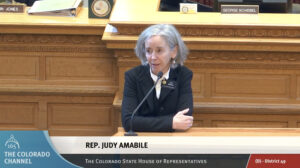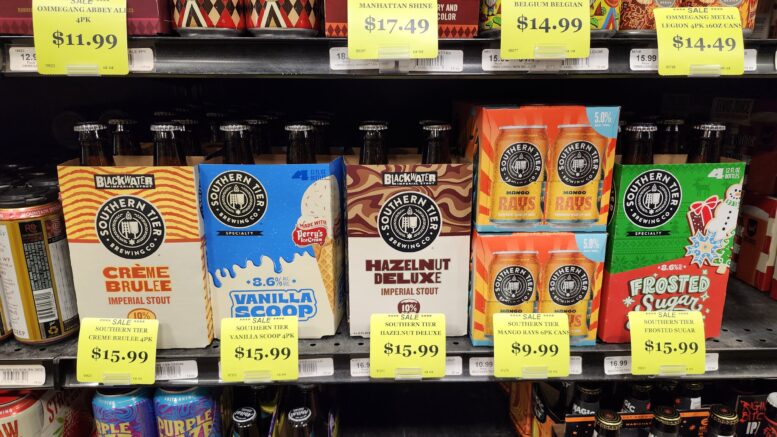Much like a bar regular returning for happy hour, Colorado’s liquor wars are back at the Capitol, beginning this year with another attempt to limit the growth of grocery stores selling a full portfolio of beer, wine and spirits.
Senate Bill 33, which cleared its first committee on Feb. 6 and awaits a hearing Friday before the Senate Appropriations Committee, is the first bill this session to pit varying interests in the alcohol-sales sector against each other, but it may not be the last. And while it got bipartisan support in its first vote, it has a long road ahead of it, much like two liquor-focused bills in 2024 that received early backing only to die late in the session despite numerous attempts to amend them to a consensus satisfaction.
Sponsored by Democratic Sens. Judy Amabile of Boulder and Dylan Roberts of Frisco, SB 33 would bar the state from issuing any more licenses for liquor-licensed drugstores, the term referring to grocers that can sell spirits as well as vinous and malt beverages. Officials have issued such licenses since 2016 to grocers that first buy out the licenses of two liquor stores in their proximity.
Background to this brush-up
The regulation came about because of the so-called “Grand Compromise” that year that permitted grocers to sell full-strength beer at all locations at the start of 2019 and to get more than one license for full alcohol sales per chain if they undertook the pricey buyouts. In exchange, grocers agreed to drop a ballot initiative that would have permitted them to sell full-strength beer and wine at every location beginning in 2017 — a change that liquor-store owners worried would wipe out many of the 1,600 locations in their ranks at the time.
But any détente between the mostly locally owned liquor stores and the mostly corporate grocery stores ended in 2022, when grocers spent $33 million to pass a ballot initiative that permitted wine sales at their stores and convenience stores beginning in early 2023. Since then, liquor stores have reported significant losses as many customers now do their booze buying at the same places where they get their broccoli and their beef, with stores commonly citing revenues drops of 25% or more.
Liquor-store backers ran a wide-ranging bill last year that sought to eliminate existing licenses for full alcohol sales at grocers, limit where alcohol could be displayed in grocery stores and cap the alcohol strength of beers and wines sold by grocers. That died in a committee in the final week of the session when a key swing vote complained that he did not want to have to referee a “zero-sum game” between the two sectors.
What’s different about this liquor bill
So, this year Amable and Roberts began with a premise that they felt might be able to generate more consensus — that nothing about current law will be changed but that grocers will not be able to get any more full-alcohol-sales licenses going forward. And it bars any company from having more than eight licenses at a time when there are about 30 such liquor-licensed drugstores spread between numerous chains.
Amabile and other supporters called it a bill that is needed to save small businesses that are the hearts of some communities from national chains that have benefitted from rules that morphed over the past decade. Roberts particularly emphasized that locally owned liquor stores are a lifeline to growth for small breweries, distilleries and wineries that have difficulty selling products in national chains.

Colorado state Rep. Judy Amabile speaks on the House floor during the 2023 legislative session. Amabile is now a member of the state Senate.
“The intention of this bill is to help our liquor stores survive in a changing landscape,” Amabile told the Senate Business, Labor & Technology Committee. “With 50% of Colorado’s local liquor stores in jeopardy of going out of business … the economic collapse of our liquor stores will devastate other industries. And when this happens, Coloradans will have little choice but to buy mass-produced products from national chains.”
Different year, same pushback
Once again, though, grocery chains, large distillers and a grocer-backed consumer group cried foul, saying that they simply are playing by the rules approved by Colorado voters who are demanding more convenience in where they buy alcoholic products. Colorado is one of more than 30 states to expand where beer, wine and spirits could be sold, but it would be the first to roll back access if SB 33 passes, said Ainsley Giglierano, vice president of public affairs and state policy for the Distilled Spirits Council of the United States.
“This bill is brought by small special-interest groups at the expense of consumers,” charged Ray Rivera, a spokesman for Coloradans for Consumer Choice, which he described as a coalition of grocers and shoppers.
Chris Howes, president of the Colorado Retail Council, emphasized that grocers have redesigned stores, hired staff and bought out liquor-store licenses as prescribed by the 2016 law, which some grocers decried at the time as being too rigorous in their obligations. Were this bill to become law, those buyouts would come to an end, he said.
Sen. Nick Hinrichsen, D-Pueblo, asked a question looming over the debate: Would passage of SB 33 just lead to more ballot measures and continuation of the liquor wars that have been going on since the Legislature ended the ban on Sunday liquor-store sales in 2008? Hinrichsen later joined all fellow Democrats on the committee and GOP Sen. Marc Catlin of Montrose in voting to advance the bill over the dissent of two other Republicans.
Could further liquor fights be brewing?
Matt Dinsmore, managing partner of Wilbur’s Total Beverage and Wyatt’s Wet Goods, warned that the bill is necessary to stop what he argued is the other inevitable next step for grocers: Pushing legislation or a ballot initiative to sell spirits in grocery stores. That, he said, framed this as a “David versus Goliath” battle, despite grocers pointing out that they do sell some Colorado craft beers on their shelves.
While those potential proposals stand like specters in the background of the debate, other observers are expecting the return of another bill this session that is opposed by a broader swath of the liquor industry: A new fee on alcohol sales. Like the 2024 attempt to limit grocery alcohol sales, a measure to add fees to beer, wine and liquor sales and put revenues to alcohol-abuse treatment programs made it out of one chamber last year before dying in a House committee under accusations that it was just a tax in disguise.
Sen. Chris Hansen, the Denver Democrat who co-sponsored that proposal last year, said in a December interview after announcing his resignation from the Legislature that he had been talking with a legislator about sponsoring a follow-up bill he had planned to carry. However, that contentious idea, which has been supported by public-health experts but panned by alcohol manufacturers as a tough burden at a time when many already are seeing falling sales, has yet to surface this year.
